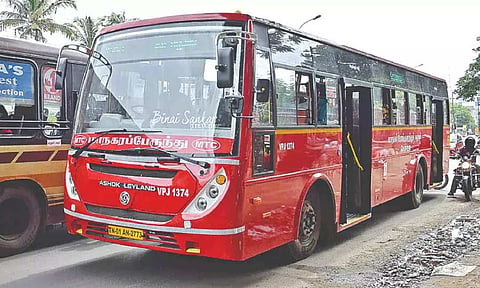

CHENNAI: As temperatures rise, driver shortages persist, and work hours get extended, pressure is mounting not just on Metropolitan Transport Corporation (MTC) drivers but also on the safety of the passengers they ferry every day across Chennai. "We are seeing drivers suffer heart problems while on duty," says Dhayanantham, general secretary, MTC-CITU union.
Unions have flagged that cardiac incidents among MTC staff are becoming alarmingly frequent. "Several times, we have intervened to ensure drivers with heart conditions are shifted to relatively less stressful routes, after discussions with MTC," Dhayanantham says. He adds that the corporation must conduct thorough, periodic heart checkups, especially when many are clocking longer shifts.
In January 2025, an MTC driver suffered a heart attack while driving near Adyar and had to be hospitalised. Though no fatalities were reported, such near-misses have reignited concerns about the growing health burden faced by frontline transport workers.
Drivers point to daily stress, particularly major strain in areas with ongoing civic works. "It’s not just about navigating traffic. There’s metro construction, road digging, and blocked lanes everywhere. It is infuriating to hear constant horns. Plus, now there are extended shifts," said a senior driver from the Perambur depot, on the condition of anonymity.
MTC officials say some healthcare provisions are in place. "Eye checkups are done at our offices anytime. In addition, multiple health checkups are conducted monthly. Beyond that, workers are expected to take personal checkups," said Senthil, assistant manager at MTC.
Still, unions argue that these check-ups are not sufficient. "They might check vision or blood pressure. But no one asks how drivers feel after driving 10 to 12 hours," rued Dhayanantham.
Official data shows that MTC operates approximately 3,392 buses with a staff strength of 19,084, including 9,265 drivers. But retirements are widening the gap. "Around 500 employees retired in the last two months alone. Recruitment is ongoing through TNPSC, and we are outsourcing some drivers through third-party agencies to manage the workload," Senthil confirmed.
In a bid to keep services running, MTC has introduced 12-hour shifts with added pay. But unions argue that fatigue from such long hours far outweighs the financial incentive.
"Drivers are getting more stressed, and instances of heart attacks are becoming more common largely because there just is not enough workforce," Dhayanantham says.
Unlike metro rail operators, MTC drivers lack a structured fatigue management policy or rotation system. As Chennai gets hotter, its roads get more congested, and public infrastructure works more widespread, the question extends beyond worker welfare, and it is increasingly about basic worker and public safety.